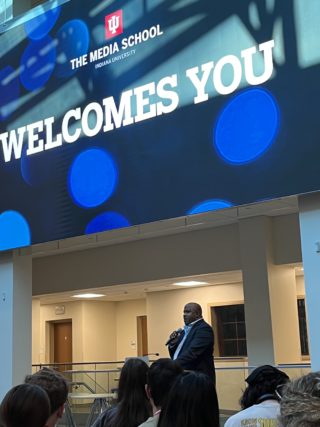Erick Johnson’s Journey In Journalism: The Power Journalism Holds

Erick Johnson gives his speech on why he is a journalist to Indiana University’s High School Journalism Institute
Photo by Kris Brown
In a media landscape often plagued by underrepresentation and skewed narratives, one individual has been a voice for the often overlooked communities. Erick Johnson is a writer and editor for the Chicago Crusader Newspaper Group and a newsroom editor for the Gary, Indiana branch of Capital B, a local-national newspaper that represents Black voices.
Johnson’s journalism journey began when he enrolled in a high school journalism course. Despite disliking the course, he won multiple awards for his writing. One day his interest for journalism sparked as he was writing a profile on a teacher. He won “most outstanding journalism senior” and went on to earn a bachelor’s degree at the University of Miami.
Post-college, Johnson began reporting on overlooked people, groups, and communities. In 1992, Octavia Morris and her boyfriend were leaving their home when a man came out and shot her boyfriend 5 times in the chest. That night, Roosevelt Myles was heading to the store when he was arrested and accused of the murder. In 1996, Myles was convicted of murder and attempted robbery. Myles was in prison for 20 years before hope arrived.
Johnson began reporting on the case in 2016. He watched the years pass by with multiple trials and many different lawyers still not making progress on Myles’ case.
“It was sad to see this man’s life destroyed for something he did not do,” said Johnson.
Johnson’s encounter with the Roosevelt Myles murder case played a pivotal role in reigniting his interest in journalism. The case fueled his conviction to shed light on stories that often go unnoticed.
In 2018, Johnson visited Oakwood cemetery in Chicago and noticed an unmarked grave. Nancy Green, also known as “Aunt Jemima”, was buried in 1923. She was one of the first African-American models hired to promote a corporate trademark. The unmarked grave belonged to Green but at the time she was buried, Oakwood did not bury African-Americans.
“I was so curious as to how she did that. Why did she have a headstone? I did the story,” said Johnson.
The article won first place in the National Merit award and was recognized by big news corporations like the New York Times and CNN.
Johnson went on to cover many more stories about overlooked people. By being a voice for the voiceless, he gained a lot of support, but also a lot of hate.
“I’ve had many sleepless nights. I’ve been sued. I’ve been subpoenaed. I’ve been threatened. My phone has been filled with obscene phone calls. It was all worth it,” said Johnson.
Despite the hate, Johnson did not quit. He knew the impact his work as a journalist had.
“I write these stories because journalism truly has a purpose. It’s not just about gossip, the latest fad, but it deals with real people, human lives. Lives that count on you as a future journalists, to speak truth to power, and to challenge the status quo. That’s what I enjoy most about being a journalist,” said Johnson.
Johnson’s journalism career has not only been a beacon of hope for overlooked cases but it is a representation of the power behind journalism.
“Journalism is about lives,” he said. “It’s about untold stories of people. And I am counting on you, all of you to go in for the right reason. Go with a purpose. Go with a reason.”

